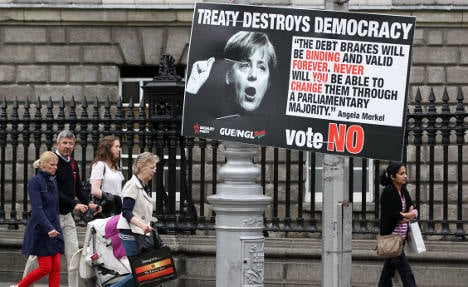“The people see it as crass blackmail, as an attempt to subjugate their freedom,” said Paul Murphy, a member of the European Parliament for the Socialist Party.
“There’s a huge anti-Merkel mood. And an aversion against German banks which Merkel is seen to represent,” he told a DAPD reporter according to Thursday’s Handelsblatt newspaper.
Murphy warned that by voting yes, the Irish people would be signing up to even harsher austerity.
“The Fiscal Pact would cost Ireland €6 billion and the EU a total of €200 billion,” Murphy said. “It will damage people’s lives, create unemployment, damage the economy,” he said. “Besides, the debt brake will take away the democratic right of people to vote for different policies.”
Though Ireland’s voters have twice rejected European Union treaties in the past, this time things are widely expected to go off smoothly and clear approval is expected.
The Fiscal Pact requires nations that use the euro to adhere to strict spending and borrowing limits and slash their debts or face heavy penalties. Ireland is the only one of 25 countries participating in the treaty to put it to a referendum, the Berliner Zeitung said on Thursday.
In recent weeks, emotions have been running high in the debate on the treaty. Irish Finance Minister Michael Noonan told Irish radio station Limerick’s Live 95 FM on Tuesday that a “No” vote would keep foreign investors away and paralyze economic growth.
In a television address ahead of the vote, Prime Minister Enda Kenny, urged people to vote for the treaty, arguing that rejecting it would bar Ireland from emergency EU funding when its current bailout package expires in 2013.
“I ask you to make a further contribution by coming out to vote ‘Yes’ on Thursday. Yes to stability. Yes to investment. Yes to recovery. Yes to a working Ireland,” he said. Kenny warned that rejecting the treaty would bring “uncertainty at a time Ireland definitely doesn’t need it.”
But opponents of the treaty have complained that they are being forced into approving it and say that voters feel bullied and angry at being forced to accept greater belt-tightening measures spearheaded by Chancellor Angela Merkel.
The German leader is a prime backer of the fiscal compact. It surrenders sovereignty on budget matters to the European Union and is being demanded by richer nations like Germany who are funding bailouts of debtor nations.
The Local /DPA/sp




 Please whitelist us to continue reading.
Please whitelist us to continue reading.
Member comments